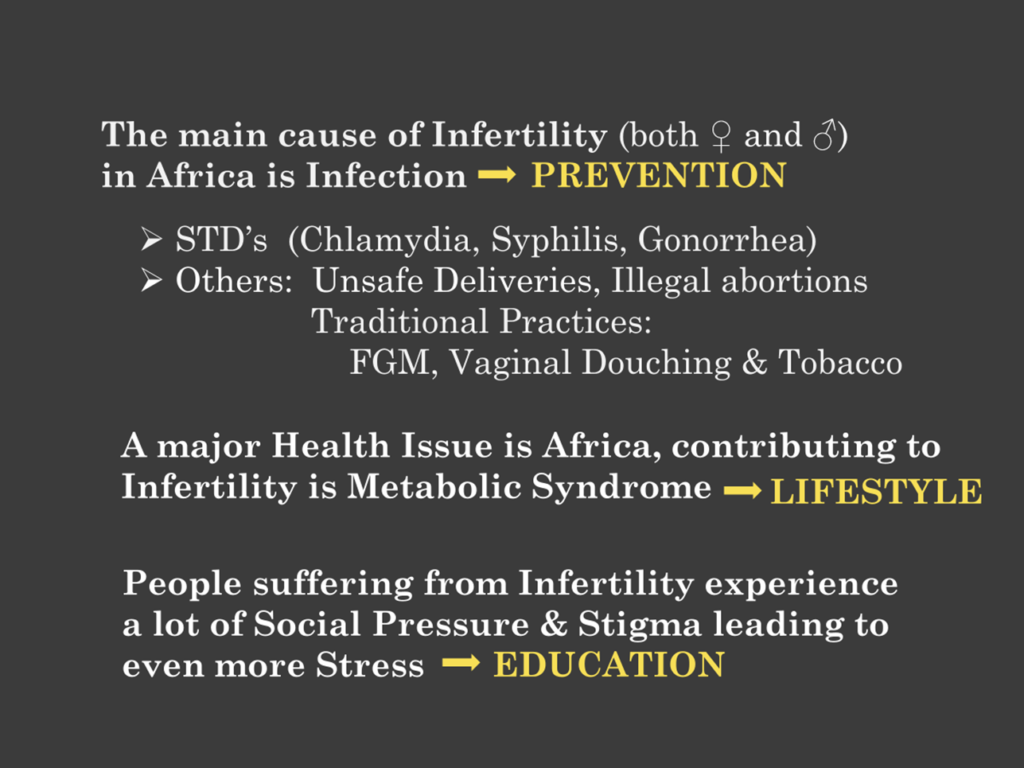Infertility is a disease of the male or female reproductive system defined by the failure to achieve a pregnancy after 12 months or more of regular unprotected sexual intercourse.
The Incidence of Infertility
Worldwide: 70 million infertile people, affecting approximately 15% (almost 1 in 6) of people in their reproductive years
Sub Saharan Africa: Up to 30% (1 in 3) of women aged 25-49 years suffer from secondary infertility, the inability to conceive after an initial pregnancy.
What can Cause Infertility
Infertility can be caused by many different underlying conditions; Male, female or a combination of them. In some cases no cause of infertility can be found and is called ‘unexplained’
Read more on Causes of Infertility
Diagnosis of Infertility
It is important to first explore all possible underlying causes of infertility. Both partners should be involved in a systematic work up. This includes:
- Extensive History taking (general, reproductive, sexual)
- Physical exam
- Lab work (spermtest, screening for infections, hormonal status)
- Imaging (ultrasound, Xray)
Treatment of infertility
Treatment of infertility is often a long process that may need involvement of different disciplines:
- Psycho-social Counselling & Support
- Advise on lifestyle: Weight Control through Diet and Exercise, Reduce Intoxications etc
- Treatment of underlying hormonal or metabolic issues such as regulating DM, Thyroid issues etc
- Treatment of infections
- Surgical correction of anatomical abnormalities
- Hormone Therapy (Ovulation Stimulation & Induction)
- Artificial Reproductive Techniques (IUI, IVF)
Key Facts on Infertility in Africa
Unlike the Western world, where the topic of infertility is openly discussed and help and information is widely available, in Africa infertility very often is taboo.
Infertility is not considered to be a medical problem but causes and remedies are often sought in the spiritual world. Women may consult spiritual healers or marabouts, or visit sacred places like the Katchikaly Crocodile Pool in Gambia.

Most of the infections that often lead to infertility can be prevented by:
- Sexual Reproductive Education
- Facilitating Safe Maternal Care & Safe Contraception incl Abortion.
Diagnosis and treatment of genital infections present several difficulties: Clinical features are not specific; many infections are asymptomatic; and laboratory tests available in the field are not always reliable. Mixed infections are common.
In order to eliminate STD’s all sexual partners need to be treated simultaneously and in polygamous societies one must always consider possible co-wives.
Read more on Sexually Transmitted Diseases
Herbs that may be beneficiary in infertility
Medicinal plants can support fertility in a variety of ways:
- Regulating hormonal balance by amplifying the hypothalamic–pituitary–gonadal axis (HPG axis) and interaction with oestrogen receptors.
- Treatment of Metabolic syndrome; a complex metabolic disorder characterized by insulin resistance, abdominal obesity, hypertension, and dyslipidaemia.
- Prevention and treatment of sexual transmitted infections (STD’s) as well as managing inflammatory reactions, hypersensitivity and autoimmune disorders.
- Increasing libido, aphrodisiacs. Several foods, drinks, and herbs help raise desire for sex. Examples are Ginko Biloba, Wild Oats and Chocolate.
- Finally Medicinal plants can provide proper nutritional conditions to regulate ovulation, implantation, uterine embryo tolerance, and foetal maturity (Akbari Bazm et al., 2019; Jiang et al., 2019).
Studies have shown the role of micronutrients in the treatment of female infertility alone and in combination with other treatments. These micronutrients include antioxidants, vitamins, fatty acids, linoleic acid, omega-3, and omega-6 (Silva et al., 2019; Naseri et al., 2019).
Some plants that may have beneficial effects on infertility:
- Pomegranate
- Chamomile
- Cinnamon
- Date Palm
- Vitex (Chaste berry)
- Fennel
- Nigella Sativa
- Liquorice
- Enkelen
- Stonebreaker
- Ginseng